Category: Arts
Save Darfur
B and I headed downtown to the Astor Place for New Work Now!, the Public Theater’s festival of readings featuring new work from emerging and established artists. The festival kicked off last week with Jonathan Marc Sherman’s Things We Want, directed by Ethan Hawke, about a lovelorn cooking-school drop-out returning home. Tonight’s reading — untitled — explored the more serious subject of the crisis in Darfur.
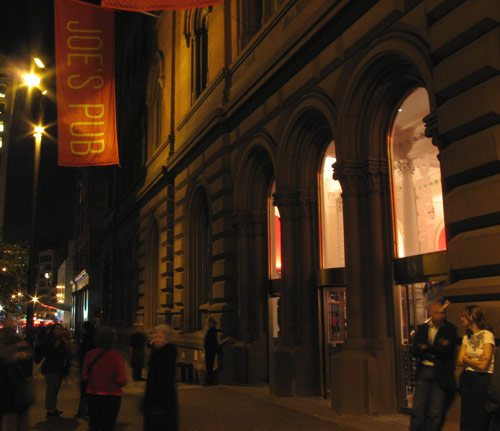
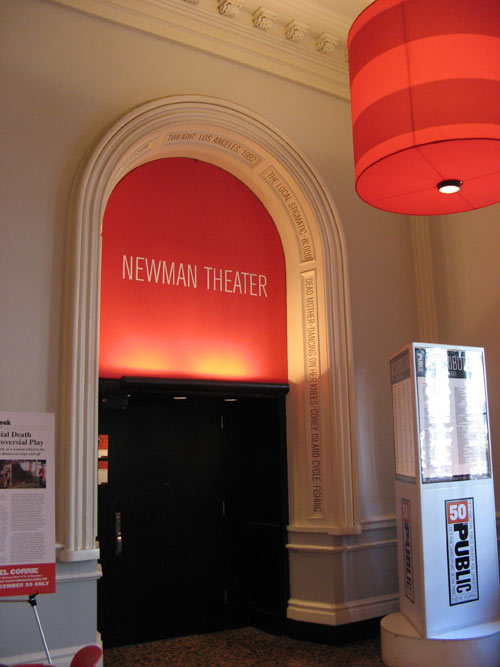
Playwright Winter Miller chose to work with her colleague, New York Times columnist Nicholas D. Kristof in dramatizing the play’s subject matter. Miller’s previously produced work includes The Penetration Play, which I saw — twice, in fact… long story — at the Mint Theatre in 2004. Kristof won the Pulitzer Prize for Commentary in 2006 for his graphic, deeply reported columns on the genocide in Darfur.
In films dealing with genocide (Hotel Rwanda and Schindler’s List come to mind), directors can portray a sweeping scope of horrors on a widescreen. Limiting the action to the confines of a stage poses additional challenges. Miller personalized the story by centering it around a trio of characters of contrasting background and perspective: a New York Times reporter, a Médecins Sans Frontières (MSF) aid worker and a Darfuri woman, whose personal nightmare has been chosen to put a face on the ravages in Africa.
From SaveDarfur.org:
Darfur has been embroiled in a deadly conflict for over three years. At least 400,000 people have been killed; more than 2 million innocent civilians have been forced to flee their homes and now live in displaced-persons camps in Sudan or in refugee camps in neighboring Chad; and more than 3.5 million men, women, and children are completely reliant on international aid for survival. Not since the Rwandan genocide of 1994 has the world seen such a calculated campaign of displacement, starvation, rape, and mass slaughter.
The actors on stage embodied their characters fully, despite never rising from their seats. Following the affecting play was a panel discussion, which included Miller, Kristof and NBC’s Ann Curry (who sat behind us during the reading.)
I would have liked to stay on, but B and I had made plans to meet up with M and L for post-theatre drinks at Public. Drinks became dinner. (This time, I opted for the grilled lamb tenderloin and merguez sausage with ancho spiced chickpeas and a radish queso fresco salad.) M broke into her mailbox for a bottle of pinot and the four of us toasted to future plans as the considerable bling on display sparkled in the candlelight.
One hell of an Elixir
At the New York City Opera tonight.
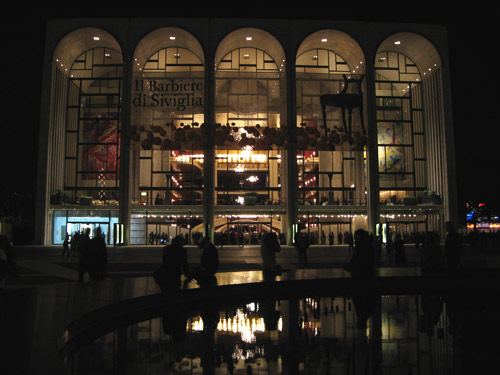
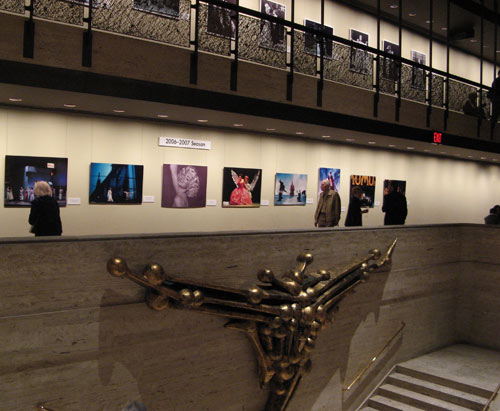
SYB got us tickets to tonight’s performance of Gaetano Donizetti‘s L’Elisir d’amore (The Elixir of Love). Sir Jonathan Miller’s new production — shared between the New York City and Royal Swedish Operas — is another of the director’s signature updates; Miller transplants the action in this Elixir from a 19th century Italian village to a 1950s high desert truck stop. The young hero, Nemorino (John Tessier), is transformed from a local villager to the town mechanic, donning the occasional cowboy hat. The local beauty for whom he pines is Adina (Anna Skibinsky in her company debut), who runs the roadside diner emblazoned with her name. Nemorino’s rival in love, the pompous soldier Belcore (Paulo Szot), is clad in Korean War-era Army fatigues; Dulcamara (Jan Opalach), who sells the titular elixir — actually, as he informs us in an aside: Robitussin — becomes the proverbial snake-oil salesman in his shiny blazer. The rest of the cast was outfitted in fitted floral dresses, jeans, leather jackets, pompadours and curler-set hair; at one point, a massive, flashy-finned Chevy convertible rolled onto the stage.
Our view from the first ring:
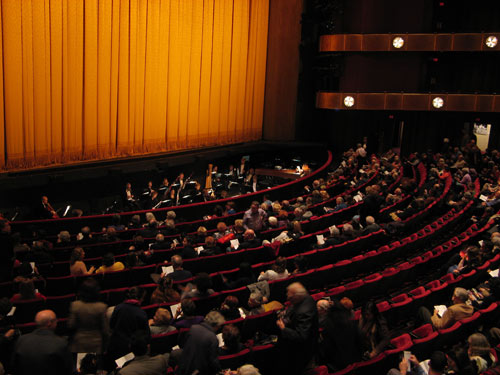
I’d enjoyed these whimsical, contemporary touches in the past. J and I attended Miller’s Mikado several years back, which was reset in an Edwardian English seaside resort; his Rigoletto played like a Mafia drama, unfolding in 1950’s Little Italy. (“La donna è mobile” blared on a jukebox.)
The performers sang in the original Italian, hamming up the action pretty admirably (taking a break only for the tenor showpiece “Una furtiva lagrima“), but the biggest laughs were elicited by the updated supertitles: lots of “dames,” “dolls” and “Daddy-O”s. To explain the legend of the elixir: “There was this chick named Isolde, and Tristan went ape over her.”
SYB noted that it was most fun he’d ever had at The Opera. Not for purists, though.
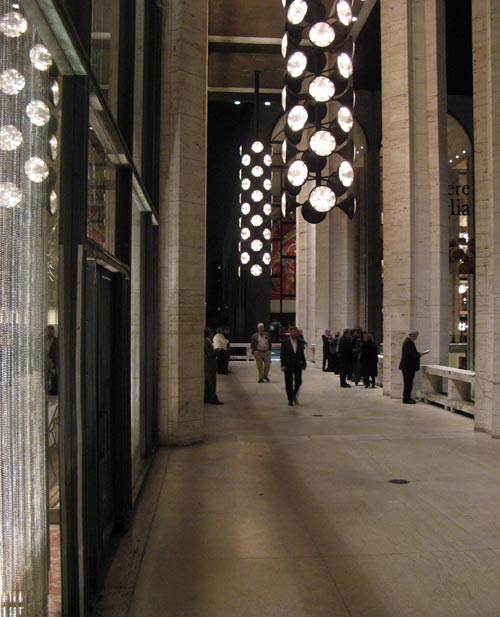
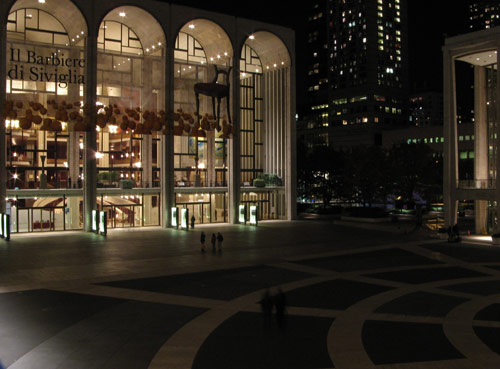
Machiavelli at the ArcLight
Instead of dinner, SYB went in for pre-theater tea at Alice’s Tea Cup. Since first discovering this place a couple of years ago – thanks, NL – it’s become my go-to place for when I’m craving a warm scone, or soothing pot of tea in the neighborhood. As SYB noted in the past, though, the estrogen runs thick in the air inside this quaint little shop/restaurant. It’s girly and dainty, but laced with an undercurrent of the bizarre that’s injected into the children’s story from which it draws its inspiration.
As a young girl, I found Alice’s Adventures in Wonderland — the Lewis Carroll original, not the Disneyfied rendering — quite perplexing, and a little scary. Check out the text with the original Sir John Tenniel illustrations via Project Gutenberg.
We stepped inside and were immediately greeted with the warm smells of sugar and spice and everything nice. We ordered the “Mad Hatter” for two: a three-tiered tray piled with smoked salmon and lapsang souchong-smoked chicken tea sandwiches, three scones, chai-spiced creme brulee and assorted fresh-baked cookies. From the extensive tea menu we each selected a pot: Indian chai and “Wedding chai” — both of which were highly aromatic, and brewed with milk and honey.

The food and drink was served in quaint mismatched china dishware with pastel flowers painted along the gilted edges.
And oh yes, the wonderful scones — my favorite in the city — dense and warm, accompanied by a ramekin of fresh cream and sweet berry preserves. The chocolate-strawberry scone was chock full of sweet, melted chunks; the pumpkin, glazed moist.

CS slipped in to join us toward the end of the tea service, finishing off the cookies and the vanilla-cinnamon scone. From Alice’s it was a short walk to the ArcLight Theatre, where we were meeting SC and JG for tonight’s play, Richard Vetere’s Machiavelli.
The 99-seat theater is located on the lower level of the 1887 Blessed Sacrament Roman Catholic Church on 71st Street between Broadway and Columbus Avenues, and modeled on the 14th century French Gothic Sainte-Chapelle in Paris.

The title refers, of course, to Niccolò di Bernardo dei Machiavelli, the 16th century political philosopher. Playwright Vetere offers a sympathetic portrayal of the man most closely associated with the phrase “the ends justify the means,” suggesting instead that Machiavelli may have been a product of his turbulent times, adapting his stated views to survive the rotating regimes of the Medici empire. Machiavelli, incidentally, never penned those famous words – the phrase is an arguably misleading oversimplification of the tenets expressed in The Prince.
Machiavelli wrote his seminal work in late 1513 (through it was only formally published posthumously in 1532) furthering the notion that power is independent of morality, and that authority and leadership are independent of virtue.
In his most famous passage:
Upon this a question arises: whether it be better to be loved than feared or feared than loved? It may be answered that one should wish to be both, but, because it is difficult to unite them in one person, is much safer to be feared than loved, when, of the two, either must be dispensed with. Because this is to be asserted in general of men, that they are ungrateful, fickle, false, cowardly, covetous, and as long as you succeed they are yours entirely.
Relatively little is known about Machiavelli’s early life compared to the other important figures of the Italian Renaissance, leaving the events open for liberal interpretation. The play’s action opens in a Florentine prison, where Machiavelli is being tortured under suspicion of conspiracy against Giuliano de Medici. Machiavelli’s quick thinking enable him to escape these circumstances, launching a pattern where adaptability becomes the key to his and his family’s survival. By focusing the action on Machiavelli’s home life — his relationship with his devoted wife, Marietta, and his daughter Baccina — rather than his political maneuverings, Vetere’s comedic portrait offers a somewhat more sympathetic treatment of the infamous man.
The acting was solid — I most enjoyed the interactions between Machiavelli (James Wetzel) and his fiesty wife, Marietta (Liza Vann). And our group was particularly interested to see Giuliano’s nephew Lorenzo, as portrayed by Jason Howard, whom CS met at the bus stop a few weeks ago. Howard is presumably less twitchy, prone to violent rages and boil-y in real life.
The play’s weakest parts were the narrative interludes as delivered by Alfonso (Lex Woutas) to introduce, break and conclude the performance. The rhyming couplets of his soliloquies didn’t quite scan — or rhyme: “reptilian”/”Machiavellian”? — but the writing wasn’t the fault of the actor, and all things considered, Woutas did a reasonably good job in the thankless task.
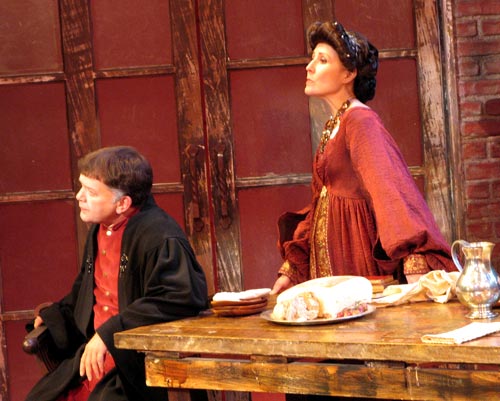
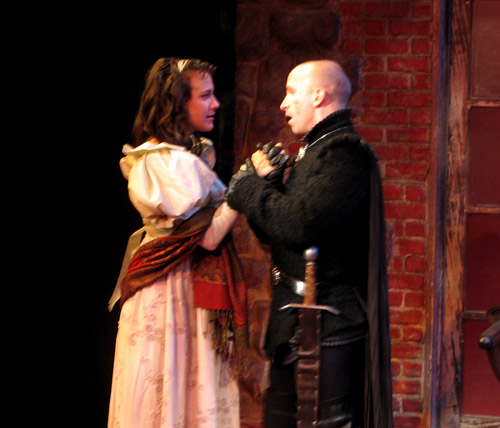
Afterwards, the five of us commiserated on the rainy street outside, and discussed plans for upcoming holidays parties, while offering directions to the occasional European stranger.
| S | M | T | W | T | F | S |
|---|---|---|---|---|---|---|
| 1 | 2 | 3 | 4 | 5 | 6 | 7 |
| 8 | 9 | 10 | 11 | 12 | 13 | 14 |
| 15 | 16 | 17 | 18 | 19 | 20 | 21 |
| 22 | 23 | 24 | 25 | 26 | 27 | 28 |
| 29 | 30 | 31 | ||||
Search
Popular Tags
Categories
Archive
- July 2010
- July 2009
- January 2009
- November 2008
- September 2008
- August 2008
- July 2008
- June 2008
- May 2008
- April 2008
- March 2008
- February 2008
- January 2008
- December 2007
- November 2007
- October 2007
- September 2007
- August 2007
- July 2007
- June 2007
- May 2007
- April 2007
- March 2007
- February 2007
- January 2007
- December 2006
- November 2006
- October 2006
- September 2006
- August 2006
- July 2006
- June 2006